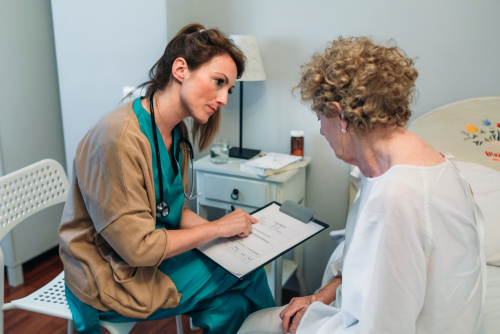As Baby Boomers age, many of their adult children find themselves having to be part-time caregivers. Many of these adult children are working full-time jobs and raising children of their own. Many have also realized that they need to have help caring for their aging parents.
Typically, the goal of the family is to assist Mom and Dad in staying in their home as long as possible. Being in their own home keeps them in their social environment of friends and family. It is where they maintain some independence and where they feel the most comfortable surrounded by their things. Sometimes, one parent has more health issues or requires more assistance than their spouse is able to provide. Or, as they age, they both could use some at- home care on a regular basis.

The entry level care for elderly people living at home is Home Care or Home Health Care. What is the difference and how do you know which is the appropriate level of care for your parents? The first thing to know is that you are not alone in developing a care plan for your parents. Most Home Care Agencies provide an assessment of your parent’s needs, as well as your family’s needs.
In many cases this assessment, usually completed by a registered nurse, is helpful in determining what type of assistance your parent needs and how often the supplemental care will be given. Together, the agency you have chosen, you—as primary caregiver, and your parents will decide what type of care would be most helpful.
Home Care includes all the activities of daily living that are non-clinical. This includes help with dressing, grooming, and bathing, as well as assistance with toileting or incontinence. It can mean transportation to the store or appointments, preparing meals, and light housekeeping. Home Care can provide companionship and activities of interest. The Home Care provider can remind the client to take their medication, but they are not able to administer the medication.

Home Health Care is a higher level of care. Usually, Home Health Care is started after the senior has been ill or injured or any situation where there will be continued health issues after discharge from the hospital or nursing facility.
Perhaps you have observed a decline in your parent’s abilities, and they need therapy to return them to their previous level of functioning. This can include physical therapy, speech therapy, or occupational therapy. If there is wound care needed or medication that needs to be administered, Home Health Care can provide these services. If they need frequent medical monitoring, such as with diabetes or high blood pressure, this can be done through Home Health Care
Your parents may also benefit from both services. An example could be that one parent needs a dressing change and antibiotics given by an RN for a leg wound. The rest of the day they need the services of Home Care for help to the bathroom and assistance with housekeeping, cooking, etc.
Medicare and Medicaid may help with the cost. If the doctor has ordered Home Health Care Services, then Medicare will likely cover the cost. Medicaid varies greatly, from state to state, so it is difficult to determine how much Medicaid will cover in the state where your parent lives.
Some long-term care insurance policies will cover the cost or part of the cost of In-Home Care. If your parent has this type of insurance, you will need to check to find out exactly what their policy covers. Of course, both Home Care and Home Health Care can be paid for by the individual themselves, referred to as private pay. The agency you are working with will assist you to determine what financial support is available for your parents’ needs.

Whether your parents need assistance short term due to injury or illness or you expect this will be a long-term need, knowing you have professional assistance when you need it can be a great stress relief. Once you have an established relationship with a professional service that provides in-home care, you know you can rely on them for future needs.
If you are going on vacation, or something happens to you and you are not able to check on Mom and Dad, your Home Health Care Agency can step in and watch over them. Even more important is the role of Home Health when you don’t live close to Mom and Dad. It will be very comforting and reassuring to know that they are being monitored by people you trust.

